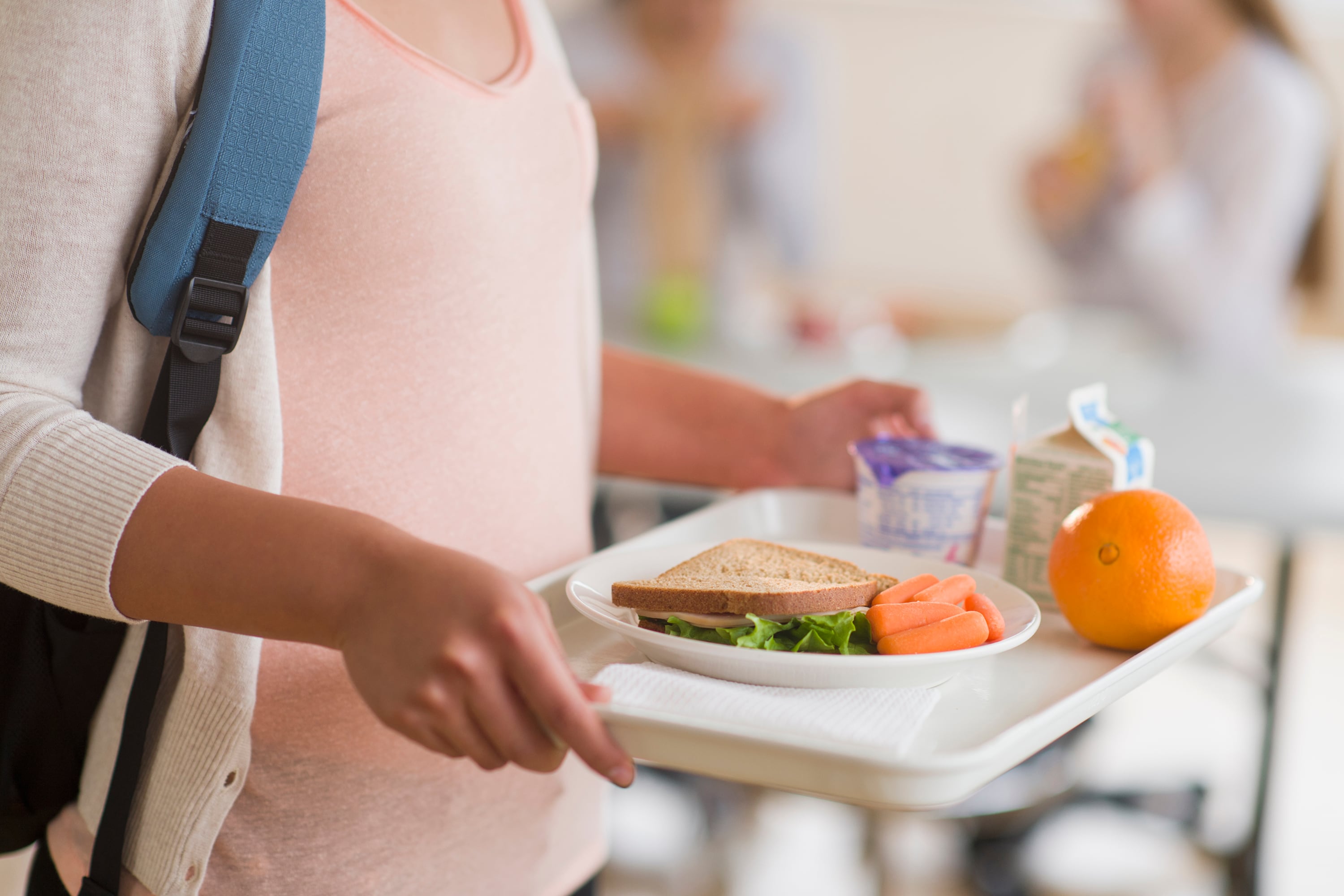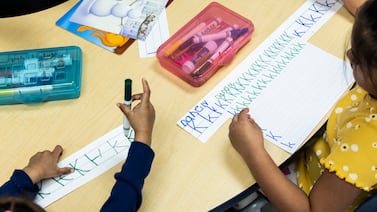Sign up for Chalkbeat Newark’s free newsletter to keep up with the city’s public school system.
When New Jersey’s 1.4 million K-12 students return for the new public school year in September, 60,000 more of them will qualify for free or reduced-price meals as a new state law kicks in, representing a new front in the state’s efforts to curb food insecurity.
The Working Class Families Anti-Hunger Act, signed into law by Gov. Phil Murphy in January, raised the upper limit on household income that triggers help with meals at school to 224% of the federal poverty line, from the previous 200% for New Jersey students.
The new limit means students from a family of four will qualify for school meals if the family has an annual income of less than $69,888, based on the federal poverty line for 2024.
The new limit will boost the number of students eligible for free or reduced-price breakfast and/or lunch at school to about 510,000, from 450,000 in the 2023-24 school year. The new total represents more than a third of the public school students in the state and marks the state’s latest effort to top up federal assistance for school meals.
It also aims to help stem what has been a sharp drop-off in the number of New Jersey students receiving help, after pandemic-era policies that had increased access to all students nationwide, ended in 2022.
Access to healthy meals expands under new rules
In the 2022-23 school year, some 340,000 New Jersey students had free or reduced-price breakfast at school on an average day, according to the Food Research and Action Center, a national advocacy group. About 628,000 had free or reduced-price lunch at school during that period.
“All students deserve access to healthy meals and this legislation provides a clear path for those in need,” said former Assistant Agriculture Secretary Joe Atchison III, whose office oversees the school lunch programs. “Having nutritious food available at school each day allows children to perform better academically as well as during extra-curricular activities.”
The expansion of eligibility will cost $30 million in the first year, and an estimated $7 million a year to maintain, state officials said.
The expansion falls short of the ultimate goal of many advocates: universal access to school lunch. New Jersey lags eight states — California, Colorado, Maine, Massachusetts, Michigan, Minnesota, New Mexico, and Vermont — that provide free school meals to all students.
Still, the change puts New Jersey near the top of states in their access requirements. Only Oregon is higher, providing free school meals for students whose households make less than 300% of the poverty line.
End of waivers meant fewer students received meals
“The new poverty threshold is a great way to make sure that kids have access to the meals that they need,” said Crystal FitzSimons, who leads work on nutrition programs in school-age children at the Food Research and Action Center. “The way that New Jersey has approached it is very exciting.”
She said the federal eligibility standard leaves a lot of families excluded from help with school meals, and raising the qualifying standard to 224% of the poverty line is a good way to help poor families, especially in a state like New Jersey with a high cost of living.
Like other states, New Jersey saw a big decline in the number of students getting free meals at school in the 2022-23 school year as the ending of federal pandemic policies drove down the number of free or reduced-price breakfasts and lunches, according to data from FRAC. Nationally, millions of children lost access to the free school meals that were available beginning in the spring of 2020 through the 2021–2022 school year, FRAC said.
“The end of the pandemic-era waivers that allowed schools to offer meals to all children at no charge had an immediate impact on school meal participation during the 2022–2023 school year,” it said.
In New Jersey, the number of students receiving free lunches dropped by almost half during the last school year compared with 2021-22, while those receiving a free breakfast declined by about 65% in 2022-23, the data shows.
Summer food programs try to offset need
But fewer students are eligible for free food when school is out during the summer. Eligibility for summer meals is based on the federal Electronic Benefit Transfer (EBT) program that feeds children from families with incomes under 185% of the poverty line. That will mean kids from New Jersey families with incomes of more than the federal limit won’t qualify for food assistance over the summer break, even if they qualify when the new school year starts.
State Assembly Speaker Craig Coughlin, a Middlesex Democrat, has made tackling hunger and food insecurity a priority in his legislative tenure, and said the disparity needs to be addressed.
“The new school meal program that begins in September is New Jersey law and will cover kids from families who earn up to 224%,” said Chris Aikin, Coughlin’s spokesman. “So those kids from families between 185% and 224% will be eligible for breakfast/lunch in school during the year, but will not be eligible for summer EBT.”
In four South Jersey counties, the summer shortfall is offset by a feeding program operated by the Food Bank of South Jersey, the national advocacy group No Kid Hungry, and Hello Fresh, a maker of meal kits.
The Food Bank of South Jersey is currently feeding about 170,000 people a month, up from 125,000 in 2022. Greg Loder, the food bank’s director of marketing and advocacy, attributed the increase to higher costs for groceries, mortgages, medical costs and a host of other household expenses that have been driven higher by inflation. More people are now turning to food banks and pantries to make ends meet because “rent eats first,” food-aid officials say.
Need for summer food assistance higher than expected
In late June, about 75 families waited in their cars in the parking lot of Delsea Regional High School in Franklinville, Gloucester County, to collect boxes of pre-packed meals, plus cook-at-home meal kits donated by Hello Fresh.
The number of clients was higher than expected at the start of the summer, according to the organizers, and is consistent with region-wide demand this year and last that is even higher than it was at the peak of the COVID-19 pandemic.
Among them was Jenna Johnson, 31, who came to collect food for herself and her two children, ages 18 months and 11 years. She hadn’t previously sought help with food but turned to the food bank because a pandemic-related federal benefit recently ended.
“I did get the assistance, and I just lost it, so this is the perfect time for this,” said Johnson, who used to be a bus aide for special-needs children at the school but is now a stay-at-home mom.
Margaret Caldwell, 65, of Malaga was waiting in line for a kit that supplies ingredients for a meal, with recipes in English and Spanish. She cares for her two grandsons, ages 12 and 8, while her son, a single father, goes out to work. Without the donated food, the boys wouldn’t go hungry, but they wouldn’t have as good a diet, she said.
Caldwell said she’s thankful for the food bank and doesn’t have any qualms about asking for help. “I’ve worked all my life, I’m retired now, and you gotta do what you gotta do,” she said.
Jon Hurdle, a freelance writer who regularly reports on water and other environmental issues, is part of the NJ Spotlight News COVID-19 reporting team. This story was first published on NJ Spotlight News, a content partner of Chalkbeat Newark.





